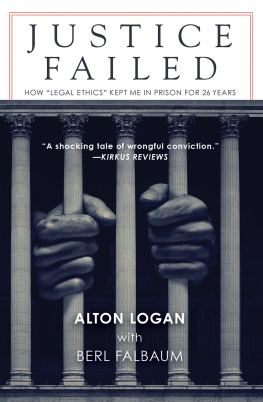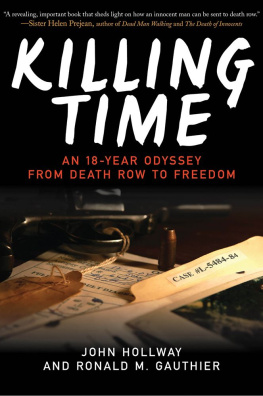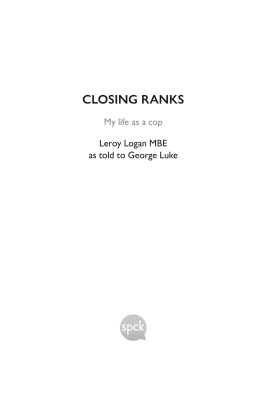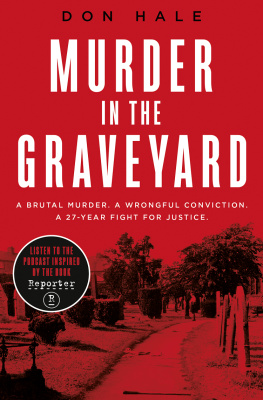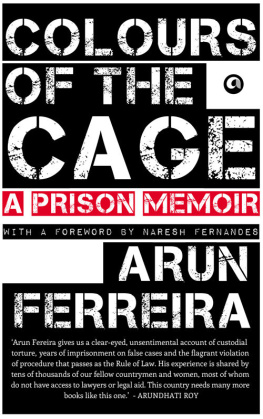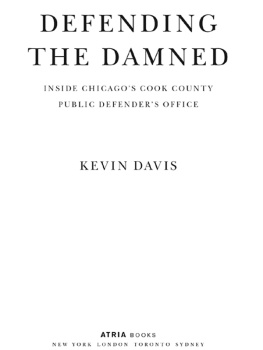
JUSTICE FAILED

JUSTICE FAILED
Copyright 2016 by Alton Logan and Berl Falbaum
All rights reserved under International and Pan-American Copyright Conventions. No part of this book may be used or reproduced in any manner whatsoever without written permission from the publisher, except in the case of brief quotations embodied in critical articles and reviews.
Library of Congress Cataloging-in-Publication Data
Names: Logan, Alton, 1953 author. | Falbaum, Berl, 1938 author.
Title: Justice failed : how legal ethics kept me in prison for 26 years / Alton Logan with Berl Falbaum.
Description: Berkeley, CA : Counterpoint Press, [2016]
Identifiers: LCCN 2017024767 | ISBN 9781619029927 | eISBN 9781619029941
Subjects: LCSH: Logan, AltonTrials, litigation, etc. | Trials (Murder)United States. | False imprisonmentUnited StatesPersonal narratives. | Trials (False imprisonment)United States. | African American prisonersUnited StatesBiography. | Legal ethicsUnited States. | LawyersMalpracticeUnited States.
Classification: LCC KF224.L55 L64 2016 | DDC 346.77303/34dc23
LC record available at https://lccn.loc.gov/2017024767
Jacket designed by Bill Smith
Book designed by Domini Dragoone
COUNTERPOINT
2560 Ninth Street, Suite 318
Berkeley, CA 94710
www.counterpointpress.com
Printed in the United States of America
Distributed by Publishers Group West
10 9 8 7 6 5 4 3 2 1
To the memory of my mother, Mary E. Logan,
and to the hope that reforms are adopted in our justice system
so that the innocent are not executed nor languish
in prison for decades.
Contents
Introduction
by Berl Falbaum
Many of us have received a traffic ticket we believe we did not deserve. We drive away cursing, and vow to the heavens to take the fight to court.
If we lose the crusade for justice before a judge, we bemoan our fate and argue, to anyone within earshot, that the legal system is a disgrace.
Now, imagine the following: You sit in a small prison cell behind steel bars for twenty-six years convicted of a murder you did not commit. Then add this minor detail: Lawyers involved knew from the very beginning that you were innocent. How? A man they represented told them he committed the crime, but because of the standard of ethics in the law, the lawyers said they were obligated to keep their clients confession confidential.
The foregoing is not a fictitious scenario. It happened in 1982 to Alton Logan, of Chicago, and he tells his painful, excruciating story in this book, and he does so without anger or bitterness. He waswe have created a two-word term for what he experiencedwrongly convicted of murder. He faced the possibility of being sentenced to death.
Instead of breaking their silence, what did the attorneys do? They drafted an affidavit stating that Alton Logan was innocent, locked the document in a strongbox, stored it under the bed of one of the lawyers, and did not speak out until their client died in November 2007. After they did, the wheels of justice turned, and all charges against Alton were dropped in September 2008.
We all know that life can, at times, be unbelievably cruel, forcing us to deal with financial calamities, catastrophic illnesses, or the premature deaths of loved ones.
Overall, most of us learn to endure, no matter how painful the ordeal because, ultimately, we attribute the circumstances to fate or, for those committed to religious principles, to Gods plan, and it is not our place to ask, Why?
We conclude that the tragedies we encountered were outside of our control and nothing could have been done to avoid them. We just have to accept that fact, and sometimes we need help to do so.
Being incarcerated, sentenced to death, or actually executed for a crime one did not commit, are entirely different matters because they result from avoidable human behavior, sometimes involving immoral, unethical, and even criminal actions.
Wrongful convictionsa catchall benign phrase that hardly reflects or fully describes the suffering of people who encounter gross injustices from our legal systemstem from: incompetence, politics, ambition, corruption, deceit, indifference, peer pressure (in jury deliberations), bribery, perjury, and simple unintentional human error (for instance, mistaken identifications).
Acceptance of dire prison and death sentences, considering their root causes, should be, it seems to me, almost too much to bear emotionally and psychologically.
How does one sit in jail for decades or face execution knowing he or she is the victim of a poor defense, the skullduggery of a dishonest and overly ambitious prosecutor, or incompetent and even corrupt police? How do the convicted come to grips with continuous rejections of appeals sometimes based on obtuse legal technicalities? Even more frustrating, sometimes appeals courts offer no explanations for their decisions, which must be the most difficult result to accept. The system feels no obligation to give the wrongly convicted reasons why they will continue to languish in a prison or face death despite their innocence.
Under these circumstances, how is it possible for those wrongly accused, convicted, and sentenced to come to terms with their fate? How do they maintain the will to live knowing the steel doors of their cells may never be unlocked?
Or worse, how do they maintain sanity understanding that they face death despite the fact that they were guilty of nothing more than being caught up in a system where justice was blind?
These are the kinds of questions, among many, many others, that I posed to Alton who, while innocent, was sentenced to life imprisonment in 1983 and served twenty-six years behind bars for the fatal shooting of a security guard at a McDonalds in Chicago.
While exonerations have become more frequent with the development of DNA evidence, Altons case is uniqueif that is the right wordbecause he was a victim of lawyer-client confidentiality, which, under a legal code of ethics, prohibits lawyers from divulging information received from clients. He was also the victim of blatant and reprehensible police misconduct and what he characterized as abhorrent abuses by prosecutors.
In Altons case, two Cook County, Illinois assistant public defenders, Dale E. Coventry and William Jameson Jamie Kunz, knew Alton was innocent. Their client, Andrew Gino Wilson, in custody for two unrelated murders of Chicago police officers, admitted to them that he killed the McDonalds security guard on January 11, 1982.
The attorneys stated in a March 2008 60 Minutes program that the requirement of lawyer-client confidentiality spelled out in the legal professions code of ethics prohibited them from divulging any information that might hurt their client. Their duty, they emphasized, was to protect Wilson. They explained very comprehensively the importance of the affidavit, which they kept secret for more than two and a half decades.
I interviewed both attorneys at great length in AugustSeptember 2015, and again in December 2015, and in the summer of 2016. From the beginning, I acknowledged that I did not agree with their decision. I wanted to be upfront and have them understand my position.
Kunz and Coventry were always candid, and did not refuse to answer any questions. I was impressed with their conviction to maintain the promise they made to their client. They repeated the obligation they had to Wilson numerous times. The two felt very strongly about the principle, and regretted deeply the price Alton paid for their unwavering decision to remain silent. Coventry, with whom I also talked several times in 2016 on the telephone, said in my last interview with him, that if I hammered him in the book, he would understand. He stood up for his convictions, and was prepared to take criticism.
Next page
